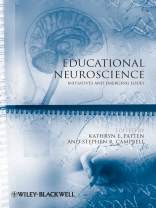Educational Neuroscience provides an overview of the wide
range of recent initiatives in educational neuroscience, examining
a variety of methodological concerns, issues, and directions.
* Encourages interdisciplinary perspectives in educational
neuroscience
* Contributions from leading researchers examine key issues
relating to educational neuroscience and mind, brain, and education
more generally
* Promotes a theoretical and empirical base for the subject
area
* Explores a range of methods available to researchers
* Identifies agencies, organizations, and associations
facilitating development in the field
* Reveals a variety of on-going efforts to establish theories,
models, methods, ethics, and a common language
Daftar Isi
Notes on Contributors vii
Foreword
Michael A. Peters xi
1 Introduction: Educational Neuroscience
Kathryn E. Patten & Stephen R. Campbell 1
2 Educational Neuroscience: Motivations, methodology, and
implications
Stephen R. Campbell 7
3 Can Cognitive Neuroscience Ground a Science of
Learning?
Anthony E. Kelly 17
4 A Multiperspective Approach to Neuroeducational
Research
Paul A. Howard-Jones 23
5 What Can Neuroscience Bring to Education?
Michel Ferrari 30
6 Connecting Education and Cognitive Neuroscience: Where will
the journey take us?
Daniel Ansar1, Donna Coch & Bert De Smedt
36
7 Position Statement on Motivations, Methodologies, and
Practical Implications of Educational Neuroscience Research: f MRI
studies of the neural correlates of creative intelligence
John Geake 42
8 Brain-Science Based Cohort Studies
Hideaki Koizumi 47
9 Directions for Mind, Brain, and Education: Methods, Models,
and Morality
Zachary Stein & Kurt W. Fischer 55
10 The Birth of a Field and the Rebirth of the Laboratory
School
Marc Schwartz & Jeanne Gerlach 66
11 Mathematics Education and Neurosciences: Towards
interdisciplinary insights into the development of young
children’s mathematical abilities
Fenna Van Nes 74
12 Neuroscience and the Teaching of Mathematics
Kerry Lee & Swee Fong Ng 80
13 The Somatic Appraisal Model of Affect: Paradigm for
Educational Neuroscience and Neuropedagogy
Kathryn E. Patten 86
14 Implications of Affective and Social Neuroscience for
Educational Theory
Mary Helen Immordino-Yang 97
Index 103
Tentang Penulis
Kathryn E. Patten, Ph.D., teaches English Literature and
Psychology; and is also the Outreach Coordinator for the
Educational Neuroscience Laboratory, a.k.a. the ENGRAMMETRON, at
Simon Fraser University.
Stephen R. Campbell, Ph.D., is Associate Professor of
Education, co-Director of the David Wheeler Institute for Research
in Mathematics Education, and Director of the Educational
Neuroscience Laboratory, a.k.a., the ENGRAMMETRON, at Simon Fraser
University.












